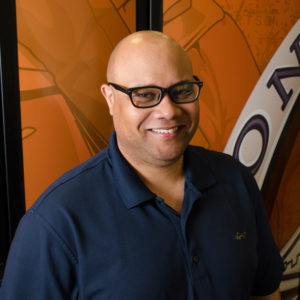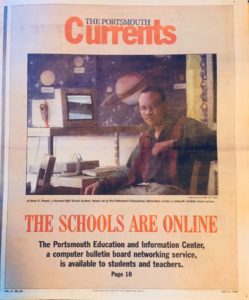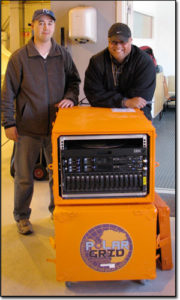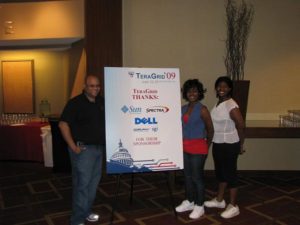In this special guest feature, Faith Singer-Villalobos from TACC continues her series profiling Careers in STEM. It’s the inspiring story of Je’aime Powell, a TACC System Administrator and XSEDE Extended Collaborative Support Services Consultant.

Je’aime Powell, TACC System Administrator and XSEDE Extended Collaborative Support Services Consultant
Stirrings of Je’aime Powell’s career in advanced computing started at an early age — three to be exact.
His father, a contractor at the Norfolk Naval Air Station in Norfolk, Virginia, didn’t like computers. But he was forward-thinking and even back in the 1980s saw the value of them, so he bought Je’aime and each of his two older brothers a computer. Since there were no real standards back then each of them received a different system. The oldest brother got a TI-99/4a (Texas Instruments); the middle brother received a Timex Sinclair ZX81 (Sinclair Research); and Je’aime received a Commodore 64 (Commodore International).
As soon as I started using the Commodore I had an immediate love for computers,” Powell said. “It was a tool that did exactly what I told it to do, and if it didn’t, I could fix it.”
Powell’s knowledge of computers grew through middle school, and in high school things really took off.
Robert Wright, a teacher in Powell’s freshman year, saw that he loved being in the computer lab. So Wright made Powell the administrator of the computer lab helping other students and teachers.
Then Powell met Dr. Linda B. Hayden, who would become a lifelong mentor. Dr. Hayden, who received the Presidential Award for Excellence in Science, Engineering and Mathematics Mentoring from the National Science Foundation, is still a force in the African-American computer science world today.

A newspaper article about Je’aime Powell in 1996 when he was still in high school.
Eager to participate in Dr. Hayden’s undergraduate computer science program, Powell would drive from Norfolk, Virginia, to Elizabeth City, North Carolina, twice a week. “I was a high schooler working with college undergraduates doing research using then cutting edge SGIs and Sun machines,” he said. “It gave me the unique experience of growing with all of the operating systems at the same time.”
Je’aime is a force of nature who has never met a computer he did not love,” Dr. Hayden said.
When he was 15, Dr. Hayden offered Powell a paid internship as a student researcher. To pay for gas during the hour-long commute each way, Powell also worked at a computer store called the DataBank. His burning curiosity, excellent work ethic, and passion for computers had an early genesis and still shines through today in his roles as a system administrator for the Texas Advanced Computing Center (TACC), and as an Extended Collaborative Support Services (ECSS) consultant for XSEDE (Extreme Science and Engineering Discovery Environment).
XSEDE is a National Science Foundation (NSF)-funded virtual organization that integrates and coordinates the sharing of advanced digital services to support science.
When it came time for college, Powell decided to attend Elizabeth City State University (ECSU), a historically black college, on a full scholarship. There, he earned his Bachelor’s degree in Computer Science and minored in Aviation. He then went on to earn his Master’s degree at ECSU in Applied Mathematics with a concentration in Remote Sensing.
It was at ECSU that Powell installed his first computer cluster.
Currently, Powell is working on his doctorate in Information Systems with a concentration in Information Security at Dakota State University to be completed by 2020.
First involvement with XSEDE

Je’aime Powell traveled to Greenland to work on the the Polar Grid project to design and deploy the computing infrastructure needed to investigate urgent problems in glacial melting.
Powell began his involvement with XSEDE in 2009 during his graduate studies when he became a Campus Champion, a local source of knowledge about high-performance computing opportunities and resources. He was earmarked to work on the Polar Grid project, a collaboration between Indiana University (IU), University of Kansas, and Elizabeth City State University. The purpose of the project was to design and deploy the computing infrastructure needed to investigate urgent problems in glacial melting.
Matt Link, who managed the supercomputing aspect of the project, took Powell in because of his technical knowledge. Powell was invited to stay at IU for a month and learn about grid computing from the ground up. When he returned to his alma mater, an IBM cluster funded by the PolarGrid grant came with him. He had to learn how to outfit a server room, set up power constraints, install software, connect complex networking, and, importantly, bring in users.
Bringing in users was becoming a part of the TeraGrid initiative [the predecessor to XSEDE). I became a Campus Champion so I could have access to the resources to help the users,” Powell said. When he left ECSU in 2012 to work for Old Dominion University as a system administrator, he became a Campus Champion there as well. In total, he was a Campus Champion for six years.
“Back in the grid computing days, when we were still arguing about whether we were going to call it a cluster or supercomputer, everybody knew everybody,” Powell reminisces. “When I go to conferences now, I see people I knew from way back. It’s those early connections that allow us to do what we do now.”
Powell says that being a Campus Champion allowed him to give access to users and help them understand the true power of being able to expand from the desktop to a cluster. “Sometimes it’s a painful transition for researchers. But it’s a worthwhile transition that enables them to work on the big problems,” he said.
Moving to Cray then TACC
Cray Inc. recruited Powell from Old Dominion University to work for the National Centers for Environmental Prediction (NCEP), one of the key national resources for weather modeling in the country. He had experience in remote sensing and aviation, so it was a natural fit. “From there, my skillset increased in ways I never imagined possible,” Powell said.
After two years at Cray, Powell joined TACC, and has been at the center for a little over a year now. He wears many hats. He works as a system administrator in the Large Scale Systems group, and he serves on the Education and Outreach team as a curriculum developer, student recruiter, and teacher. He’s also a lecturer for TACC’s Introduction to Scientific Programming course at The University of Texas at Austin.
In addition, Powell is back with XSEDE serving as an ECSS consultant. He does system maintenance for all of the TACC systems including Stampede2, Lonestar5, Jetstream, and Wrangler. His ECSS specialty, however, is Globus, where he assists users with their connection issues.
“Currently, we’re waiting for Globus to roll out their new software solution for transferring data. We have a lot of users coming from different universities and companies that need to use the resources. Security is essential,” Powell said.
The First SGCI/XSEDE Hackathon at PEARC18

Je’aime Powell participating in TeraGrid 2009. TeraGrid was the precursor to XSEDE.
Powell is about to bring a “first” to the Science Gateways Computing Institute: a science gateways hackathon in conjunction with PEARC18 and led by Dr. Hayden. The NSF-funded Science Gateways Community Institute (SGCI) provides knowledge and engages the community to create new portals and gateways as resources for scientists.
I’m excited for the future of science gateways and the creation of a Hackathon to develop the next generation of gateway developers,” said Maytal Dahan, Director of Advanced Computing Interfaces at TACC and co-Principal Investigator on the SGCI team. “Being a funded Institute by NSF, we help pave the way for how to make this community as sustainable and effective as possible. And we help shape the next wave of gateway technologies and talent into the field of gateway development.”
Powell and Dr. Hayden are hoping that the hackathon will be one of the first big outreach achievements of the PEARC annual conference.
Generally speaking, an outreach organization’s main task is to introduce students to ideas. But being able to sit them down, give them a problem, and have them address that problem and produce a real result is a lot more beneficial,” Powell said.
Powell and Dr. Hayden anticipate 15 to 20 undergraduate and graduate students to compete on three to five teams. The organizers will choose a problem, find a scientist with that domain knowledge, locate a dataset, and search for a set of software and hardware resources that the students can use. The students are sequestered in a room for 24 hours to work on the problem, either by creating a portal or reusing and reconfiguring the code from a portal that already exists. At the end, the students will have developed a final portal.
Passion for Education and Outreach

In his early years, Je’aime Powell was a co-instructor to recruit at-risk high school students and teach them calculus. Powell is pictured at the far right.
While technology is seamless and fun for Powell, he has a passion for education and outreach, something that started when he was an undergraduate at ECSU. He became involved with an internship to bring in at-risk high school students and teach them calculus.
I remember one particular student who said, ‘I am never going to get this.’ We were in a difficult section — transitioning from limits to derivatives — a huge knowledge gap that you have to jump. One second he was frustrated and the next second the light turned on. I remember it really, really clearly and from that point on he had a taste of success. That moment made me want to teach and do more enrichment in education and outreach,” Powell remembers.
In his early years, Je’aime Powell was a co-instructor to recruit at-risk high school students and teach them calculus. Powell is pictured at the far right.
When Powell got hired at TACC over a year ago, he found out that the Education and Outreach group was looking for volunteers. “Heck, yeah, I’m in!” was his response. “I have this weird duality of high technology and yet I can turn a wrench.” Those skill sets work well together as part of TACC’s Code@TACC programs. “We’re soldering, we’re connecting wires, we’re figuring out how the electrons work, and then we’re learning the software. Helping under-represented and low income students make that transition is amazing.”
Being able to work with students where their whole lives revolve around negativity — being able to help break that cycle and offer a path away from it — that’s what means the most to me about working with these kids. Options, goals, and hope are what can set you on a path that can change your life,” Powell said.
His advice to younger students is a simple recipe for success: “You may not know what you want to do from the beginning, but you need to figure out what you like to do, or what you don’t mind doing. Try to build gratefulness in your life. Talk to people. It’s ok to be wrong. Plan on going to college.”
I’m fortunate for the influence of the early mentors I’ve had along the way,” Powell said. “Now, I get to go to work and play, while being a mentor to those students who are in a place I’ve experienced.”
Source: TACC




